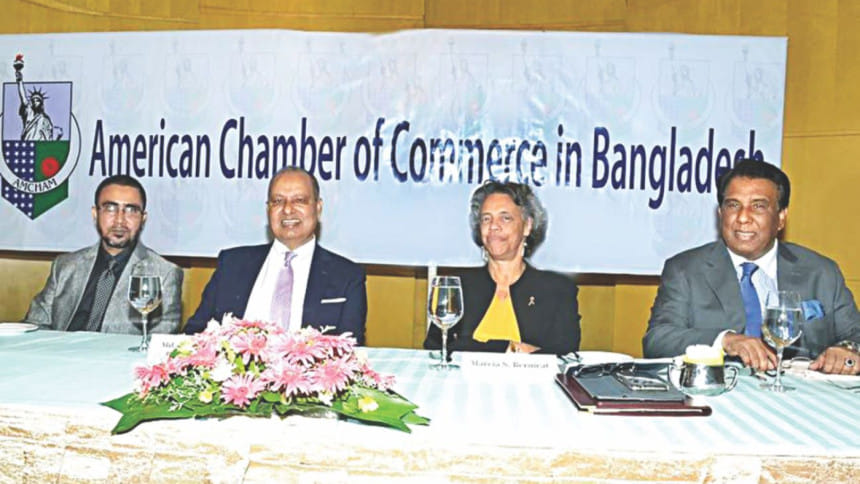Graft deters foreign investment

Corruption, cumbersome customs procedures and poor sanitary and phytosanitary standards are major barriers to attracting foreign direct investment to the country, said the US ambassador to Bangladesh yesterday.
“Fewer problems, no corruption and quicker electricity and gas connections are Bangladesh's selling points to foreign investors,” said Marcia Bernicat.
She said other factors acting as hurdles to bring FDI include inefficient bureaucracy, unfair trade, unnecessary or arbitrary regulations, biased tendering process and poor performance of ports.
All these poor conditions are manifested in a variety of ways and foreign investors take these factors into account before investing in this potential destination, she said.
“We want transparent business environment and a level playing field for US businesses,” Bernicat said while speaking at the monthly meeting of the American Chamber of Commerce in Bangladesh (AmCham) at the Westin Hotel in Dhaka.
She spoke on overcoming obstacles in doing business in Bangladesh.
German Ambassador Thomas Prinz also made a similar comment last week, saying corruption in Bangladesh is the main barrier to attracting foreign investment from Germany.
Bernicat said a US delegation during the last meeting of the Trade and Investment Cooperation Forum Agreement (Ticfa) in Dhaka in May was highly impressed of the economic progress of Bangladesh.
At the same time, they also called for improvement in business climate for more business and more foreign investment, she said.
Bernicat urged the Bangladesh government to amend the labour law and the Export Processing Zones law, raising them to international standards in line with the commitment the government made during the International Labour Conference in Geneva in June this year.
She called for urgent progress to improve the labour rights in Bangladesh so that US apparel retailers and brands do not complain about the poor working conditions and freedom of association.
“There is growing concern among US buyers about the poor working conditions and less freedom of association in Bangladesh.
These act as risk factors and the buyers are prevented from growing their business in Bangladesh,” she said.
The US envoy welcomed the government's decision for granting additional time to the Accord and the Alliance to operate in the country, allowing Bangladesh to utilise the expertise of the remediation efforts of global buyers and retailers.
On Rohingya issue, Bernicat said the crisis has had an impact on the economy of Bangladesh.
“But I want to express my deep appreciation for the people and the government of Bangladesh for their generosity in responding to the urgent need of the Rohingya refugees fleeing to this country,” Bernicat said.
“I commend the continued hospitability of Bangladeshi people, especially those who live in Cox's Bazar area.”
She said Bangladesh could truly recollect the memory when its people had also taken shelters in India during the Liberation War in 1971.
The ambassador recently visited Rohingya camps in Cox's Bazar.
She said her government has been working through the diplomatic channels such as UN bodies and other international organisations to urge the Myanmar authority to end the violence in Rakhine state.
Myanmar should protect civilians, provide unfettered humanitarian access and ensure humanitarian assistance, she said, adding that the US has also urged the Myanmar army to stop operations targeting Rohingya people.
The diplomat said the US has also joined other countries to urge Myanmar to ensure voluntary return of Rohingya people from Bangladesh to their ancestral home.
Last year, the US contributed nearly $140 million in assistance for the Rohingya people, she said.
The US is the single largest foreign direct investor in Bangladesh and also the single largest export destination for the country. Two-way trade stood at $6.8 billion last year with the balance heavily tilted towards Bangladesh.
Bangladesh imported goods worth $895 million and exported goods valued nearly $6 billion last fiscal year.
“Nevertheless, there is a lot of scope for increasing the bilateral trade between the two countries,” said Bernicat.
AmCham President Nurul Islam also spoke.

 For all latest news, follow The Daily Star's Google News channel.
For all latest news, follow The Daily Star's Google News channel. 




Comments